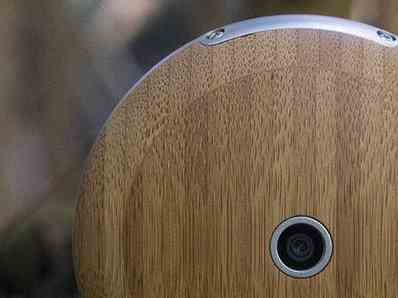
A London PR agency says this year people will forsake gadgets, social networks and other technology in favour of the simple life. And there are plenty of examples – from declining numbers on Facebook and Twitter, to a planned new phone called The Runcible – which is made of WOOD.
In its Digital Trends Report, Hotwire, says we are entering the era of what it rather disparagingly calls the ‘neo-Luddite’ The report, which followed figures by Ofcom released in December, found the number of weekly UK visitors to social networks is now 56 per cent – a drop from 65 per cent this time last year.
And the new Wooden phone – called the Runcible – is a cross between a smartphone and a wearable. The gadget is modelled on an old-fashioned pocket watch and compass. It could cost around the same as a high-end unlocked smartphone.
The round phone, described as the first personal device for the ‘post-smartphone era’, is modelled on an old-fashioned pocket watch.
The Runcible is a pebble-shaped prototype and includes a phone and camera, an HD circular screen and a wooden case.
It’s designed ‘refocus users’ attention on real people and the real world’ and is touted as being the ‘world’s first heirloom electronic,’ by Monohm Inc, which created the prototype.
Aubrey Anderson, CEO and co-founder of the California-based company, said: ‘People need something to let them control their digital lives in clean, quiet, simple ways.
Elsewhere, in August, a team of developers launched a Kickstarter campaign to fund production of its noPhone – a fake handset designed to wean people off their tech addiction.
‘Runcible is the alternative to the increasingly invasive and commodified smartphone whose app-centric approach distracts us from our lives instead of helping us live them.’
The device, which is a cross between a traditional mobile phone and a wearable device, features the ‘first’ high resolution, fully round screen in a phone, as well as a high performance camera, although it is no specified how good it is.
Inspiration for the unusual shape comes from ‘devices that humans have always carried with them: the pocket watch, the compass, the magical stone that fits the palm of our hand,’ the company said.
The device is built on Mozilla’s Firefox operating system and will see users visiting mobile websites instead of navigating the web via dedicated apps.
It also includes features designed to refocus users’ attention on real people and the real world.
For example, a maps feature shows the most interesting route to a chosen destination, rather than the fastest, social media feeds are summarised and the device is silent.
‘Runcible will never beep, alert or otherwise interrupt us, enabling us to keep our attention where it has always meant to be,’ the firm said.
It offers connectivity expected of a smartphone, such as LTE, Wi-Fi and Bluetooth.
‘For the rest of the time, you can keep your head up, your attention on the real world and real people around you, and maintain your sense of wonder about life,’ according to the company’s website.
The device requires no apps or extra software and is intended to last for years, unlike other smartphones, which are typically traded in for a newer modelafter 24 months.
‘Runcible’s parts can be removed, repaired, and upgraded, enabling the device to be kept for decades,’ the firm said.
It aims to build what it calls ‘new necessities,’ which are devices that combine form, function and technology that allow people to have ‘a more civilised relationship with…[their] digital life.’
The device is currently a prototype and is being unveiled at Mobile World Congress in Barcelona, this week. Availability and pricing will be revealed towards the end of this year.
It is likely that the phone will cost the same as a premium, unlocked smartphone, such as an iPhone 6, which is around £540 ($650).
Also at Mobile World was the launch of Blackphone 2 – aimed to prevent advertisers tracking our every move.
The original Blackphone was unveiled last year and its successor – the Blackphone 2 – as well as the first ever Blacktablet have been announced at this year’s Mobile World Congress in Barcelona.
The range is fully encrypted by default and comes with a suite of secure features that let you make calls and send texts that are impossible to eavesdrop on or track.
Blackphone’s Android-based devices are built by Spanish manufacturer GeeksPhone alongside security experts Silent Circle and Pretty Good Privacy (PGP).
They launched the original handset at last year’s Mobile World Congress and told MailOnline that the range is for people who ‘want to stay private without compromising on the features seen on typical Android phones.’
Everything from the custom-built PrivatOS to web browsing and apps, are encrypted, or have been fitted with an extra layer of security.
PrivatOS is a so-called ‘skin’ that runs on top of traditional Android software, meaning all Android apps are compatible.
As the firm explained: ‘There is no bloatware, no hooks to carriers, and no leaky data.
‘It puts privacy in the hands of you and your [business], without any sacrifices.’
If the Blackphone 2 is locked, a business can remotely lock and wipe just the enterprise profile while letting the owner take control of the private profile.
Internet access is carried out through a virtual private network (VPN) that sends and receives data in a way designed to keep it hidden.